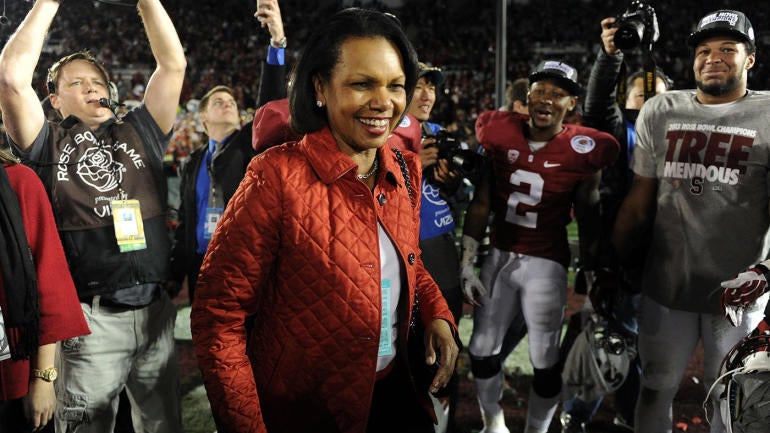
The first issue for the next NCAA president: What is the association even going to look like for Mark Emmert's successor?
That's the key question in assembling a list of candidates to replace Emmert, who announced Tuesday that he's resigning effective June 2023. The NCAA he is leaving behind is in a bit of shambles. There must be some certainty before the next leader evaluates what they are getting into.
That's why it's probably wise to have a lengthy timeline. The NCAA is in the middle of reconstructing its constitution. The association is losing its grip on the FBS. The next president may literally be a glorified liaison to Congress. Point being: if Congress has oversight over name, image and likeness, it isn't going to stop there.
Emmert's successor cannot be bogged down in minutiae. Running the NCAA in the future will have to be about appeasing the Power Five. If not, those schools have the means to break off on their own.
First, history would suggest the NCAA has to lean away from hiring a school president as its next leader.
Dick Schultz (1988-93), the former Virginia president, was run out in scandal. As many platitudes as former Indiana president Myles Brand received, he failed to act early in the Ed O'Bannon case. That cost the NCAA dearly in the courts and in the court of public opinion.
Emmert -- a former chancellor at LSU and president at Washington -- was just the wrong choice. He was detached and arrogant. He could not lead or build consensus. He was the absolute opposite of what a CEO in any big company must be.
The NCAA Board of Governors can't make the same mistake again.
The presidential model hasn't worked. That said, it could. There are some names out there who have made it part of their career to be deeply involved in athletics. More than that, they've shown an ability to build consensus. Emmert never had that.
Let's take a look at the top candidates to replace Emmert.
1. Dan Gavitt, NCAA senior vice president for basketball: If he's interested, Gavitt has to be the No. 1 candidate. Right now, the NCAA does one thing really well -- putting on its basketball tournaments. Gavitt runs those events tournament. He has the demeanor and the mutual respect to inject some credibility back into the president's office. Yes, he is in Emmert's inner circle, but he has thrived on his own despite that link. The argument can be made Emmert lasted this long because of Gavitt's expertise. Forget NCAA president, given his accomplishments and background, Gavitt -- at age 55 -- could be the president. That's speaks to his talent level and popularity.
2. Val Ackerman, Big East commissioner: An icon in women's athletics, a leader in the reconstituted Big East, a lawyer. Ackerman checks a lot of the boxes. The first president of the WNBA (1996-2005) is the visionary the NCAA needs. When COVID-19 hit the Big East, the conference was fully insured against loss thanks to her leadership. Like all these candidates, she is qualified. It's a question of whether Ackerman has the desire to take the NCAA's heavy lift.
3. Linda Livingstone, Baylor president: Another Big 12 commissioner candidate, Livingstone is a member of the NCAA Transformation Committee responsible taking Gates' work and reshaping the NCAA. The former Oklahoma State basketball player oversees a private university with a powerful athletic department that chases championships the right way following the sexual assault scandal. We know Livingstone is engaged. She is simultaneously on the NCAA Board of Directors and Board of Governors. Either way, she is going to influence association policy.
4. Condoleezza Rice, former U.S. Secretary of State, National Security Advisor: We're literally talking about a person who has stood up to Vladimir Putin. Rice told that story a couple of years ago during a book tour. (For the record, she was across a negotiating table and made sure the Russian ruler knew she was taller.) She is more than qualified, then, to run the NCAA. It was her basketball reform commission that suggested how to clean up the game in the wake of FBI/SDNY scandal. During her time on the College Football Playoff Selection Committee, sources say her knowledge of football was second to none.
5. Robert Gates, former U.S. Secretary of Defense and CIA director: Most recently, Gates served on the NCAA Board of Governors and was the constitution committee chairman. Gates might have achieved the impossible -- a rewrite of the NCAA constitution in only five months' time. In that span, the constitution was shrunk from 43 to 18 pages. "It really has to do with getting the NCAA, at a national level, out of the picture in a lot of cases," he said. Gates continues to get raves from those who worked with him on that committee.
6. Chris Howard, executive vice president and CEO of Arizona State Enterprise: The former Robert Morris president burst upon the athletic scene when he joined the CFP committee in 2017. Howard maneuvered impressively among athletic types in the room. An Air Force graduate and Rhodes Scholar, Howard won the academic Heisman -- the Campbell Trophy -- as a Falcons running back. One meeting with him, and you'd be convinced.
7. Kirk Schulz, Washington State president: OK, another president. This one makes sense. Schulz might have his choice between Big 12 commissioner and NCAA president, though he has already publicly denied interest in both positions. Still, he's that good and that respected that his name keeps getting mentioned. He knows the landscape having been a president in the Big 12, SEC and Pac-12. From 2015-17, Schulz was chair of the NCAA Board of Governors. That's the same group that showed Emmert the door.
















